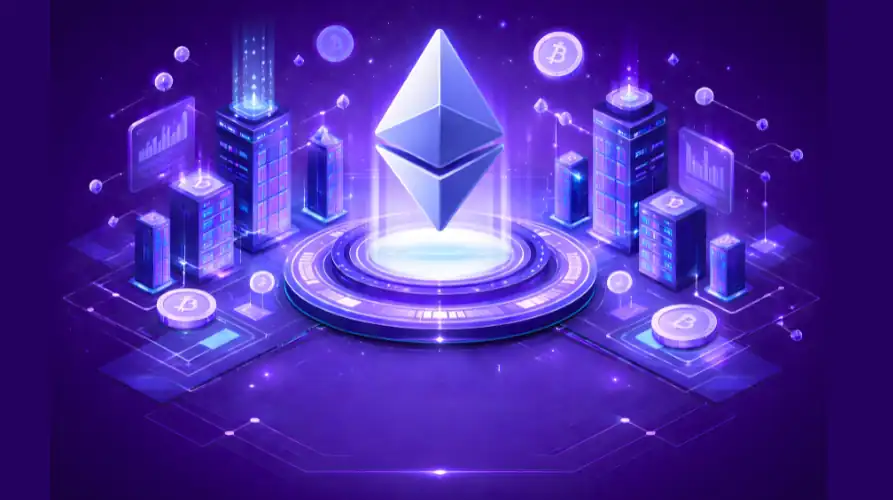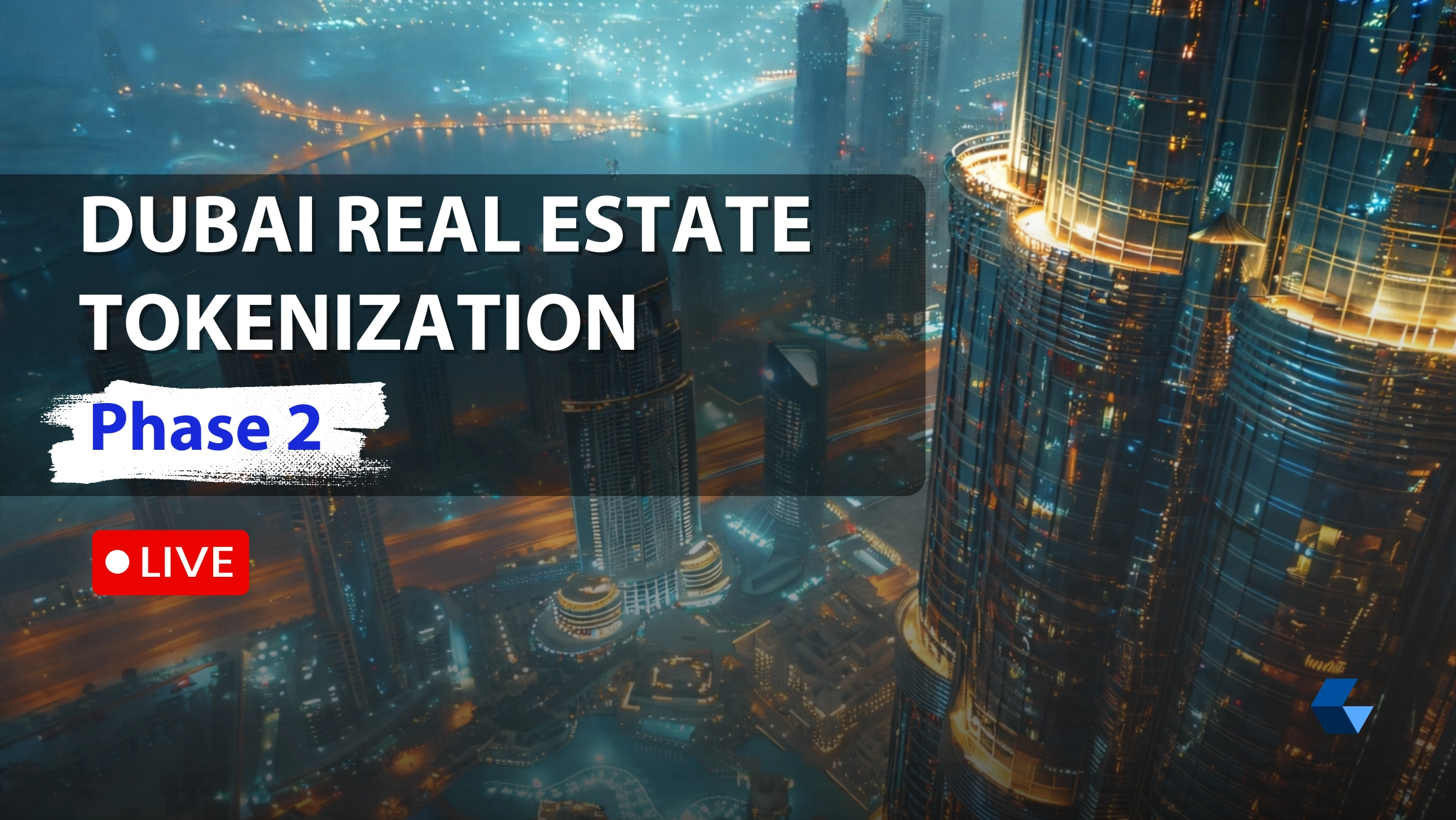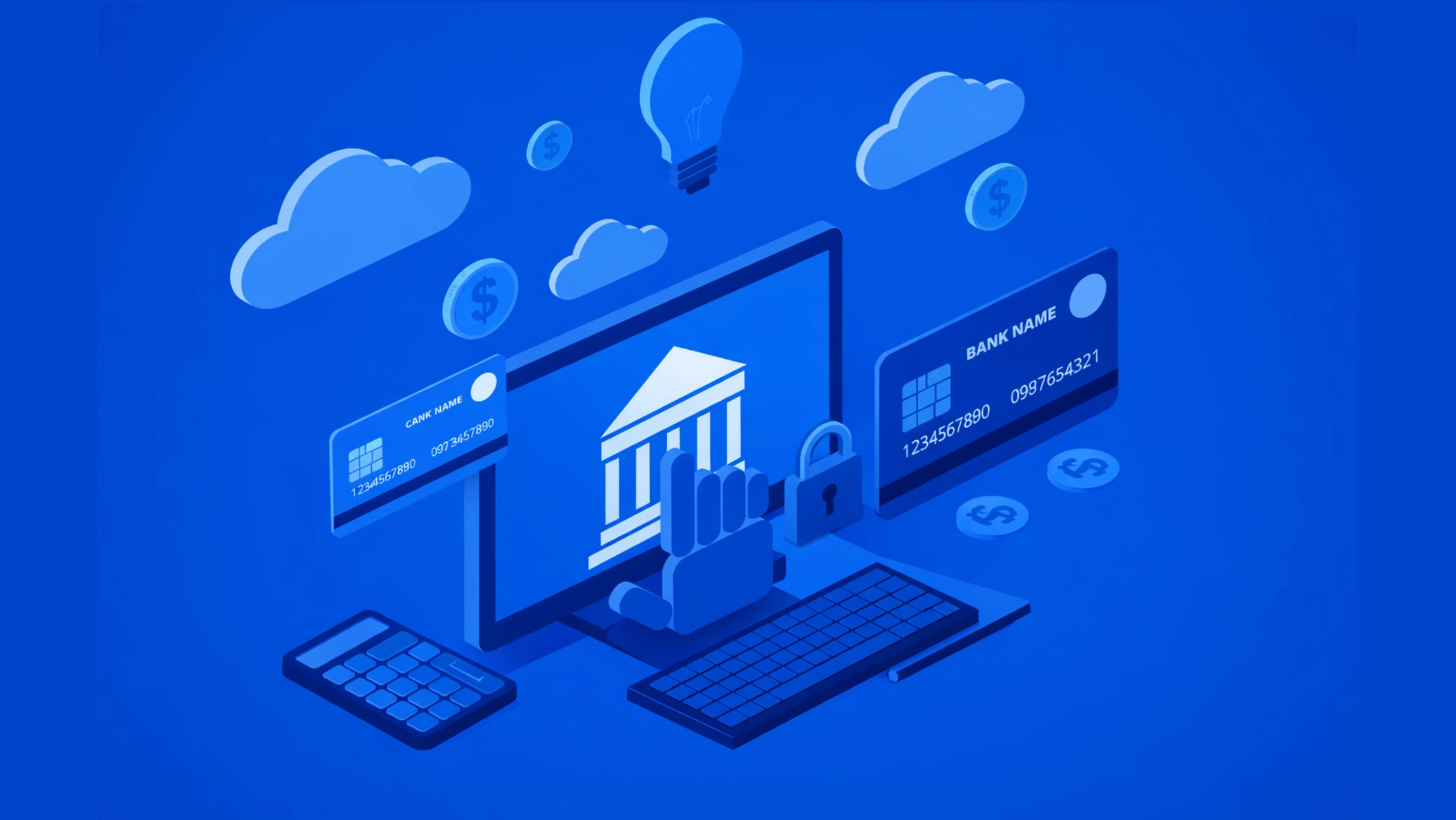Key Takeaways
- DAOs utilize smart contracts to automate governance processes, eliminating centralized control and enabling transparent, community-driven decision-making across blockchain networks in major markets like the USA, UK, UAE, and Canada.
- On-chain voting mechanisms encoded in smart contracts ensure tamper-proof proposal execution, with votes weighted by token holdings, providing verifiable and immutable governance records accessible to all participants.
- Token-based governance models grant voting rights proportional to holdings, though advanced mechanisms like quadratic voting and conviction voting address plutocracy concerns and enhance fairness in decentralized organizations.
- Smart contract automation executes approved proposals without human intervention, with timelock mechanisms and multi-signature requirements providing security layers against malicious governance attacks and unauthorized changes.
- Gas costs and scalability challenges remain significant obstacles for on-chain voting, prompting solutions like Layer 2 implementations, snapshot voting, and vote delegation to reduce transaction expenses.
- Real-world DAO applications span DeFi protocols, investment funds, and protocol governance, with organizations managing billions in assets through transparent smart contract-based decision-making frameworks.
- Security audits and formal verification are critical for DAO smart contracts, as vulnerabilities can lead to treasury drains, governance attacks, and irreversible losses affecting thousands of token holders.
- Future DAO governance innovations include cross-chain voting, AI-assisted proposal analysis, privacy-preserving voting mechanisms, and regulatory-compliant frameworks balancing decentralization with legal requirements across jurisdictions.
Introduction to DAO in Smart Contracts
Decentralized Autonomous Organizations represent a paradigm shift in organizational governance, leveraging blockchain technology to create transparent, community-driven entities operating without traditional hierarchical structures. At the core of every DAO lies smart contract infrastructure that automates decision-making, enforces rules programmatically, and enables thousands of stakeholders to coordinate effectively across borders. With our 8 years of experience implementing DAO frameworks for clients across the USA, UK, UAE, and Canada, we have witnessed the evolution from experimental governance models to sophisticated systems managing billions in digital assets. Smart contracts transform governance from trust-based systems requiring intermediaries into trustless protocols where code execution is deterministic and verifiable. This technological foundation enables organizations to operate with unprecedented transparency, where every vote, proposal, and treasury transaction is permanently recorded on-chain and accessible to all participants. The integration of DAO principles with smart contract automation has created new possibilities for collective decision-making, resource allocation, and organizational coordination that challenge traditional corporate structures and regulatory frameworks.
What Is a DAO and Why Smart Contracts Are Essential
A Decentralized Autonomous Organization is a blockchain-based entity governed by rules encoded in smart contracts rather than traditional corporate bylaws enforced by legal systems. Unlike conventional organizations where boards, executives, or managers make decisions, DAOs distribute decision-making power among token holders who vote on proposals through transparent on-chain mechanisms. Smart contracts are absolutely essential to DAO operations because they provide the enforcement mechanism that makes decentralized governance possible without requiring trust in any central authority.
The fundamental reason smart contracts are indispensable to DAOs is their ability to execute governance decisions automatically and immutably once predetermined conditions are met. When a proposal receives sufficient votes to meet the quorum threshold defined in the smart contract code, the approved action executes automatically without human intervention or the possibility of selective enforcement. This programmatic execution eliminates the principal-agent problem that plagues traditional organizations, where managers may act against stakeholder interests. In our experience deploying DAO solutions across North America, Europe, and the Middle East, organizations recognize that smart contract automation provides the credible commitment mechanism necessary for decentralized coordination among participants who may never meet or trust each other personally.
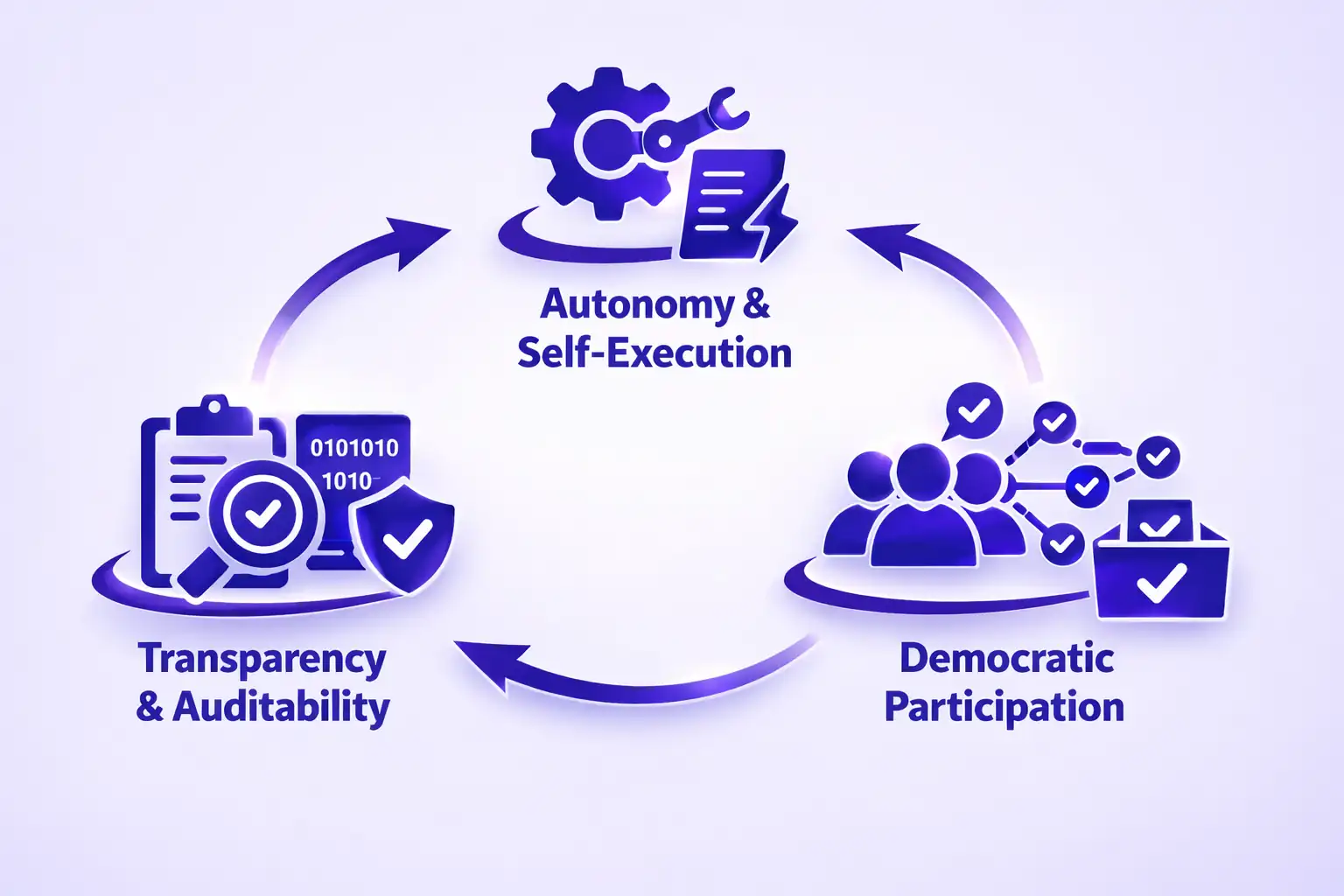
Core Principles of Decentralized Governance
Transparency and Auditability
- All governance actions recorded on public blockchain
- Smart contract code visible and verifiable by anyone
- Treasury movements tracked in real-time on-chain
- Voting records permanently accessible and immutable
Autonomy and Self-Execution
- Approved proposals execute automatically via smart contracts
- No central authority can override governance decisions
- Code enforces rules consistently without human discretion
- Resistance to censorship and external interference
Democratic Participation
- Token holders participate directly in governance decisions
- Proposal creation open to community members
- Voting rights proportional to stake or modified by mechanism
- Global participation without geographic restrictions
Smart Contract Automation in Governance Decisions
Automation represents the defining characteristic that distinguishes DAO governance from traditional organizational structures, with smart contracts executing approved decisions without requiring intermediary action or trust in any centralized party. Once proposals pass voting thresholds and survive timelock periods, execution contracts automatically implement changes through direct blockchain state modifications. This automation extends beyond simple parameter updates to complex operations including treasury fund transfers, integration with external protocols, token minting or burning, and even upgrades to the governance system itself through proxy contract mechanisms.
The technical implementation of governance automation relies on carefully designed execution frameworks that validate proposal actions before deployment, ensure atomic transaction execution to prevent partial failures, and emit comprehensive event logs for community monitoring. Smart contracts batch multiple governance actions into single atomic transactions, guaranteeing that complex proposals either execute completely or fail entirely without leaving the system in inconsistent states. Advanced implementations incorporate conditional execution logic, enabling proposals that trigger different actions based on on-chain conditions at execution time. Our 8 years deploying these systems across USA, UK, UAE, and Canadian markets demonstrates that proper automation architecture reduces governance overhead, eliminates execution delays, and prevents the selective enforcement problems that plague traditional organizations where leaders may ignore or delay implementing democratically approved decisions.
Scalability and Gas Cost Considerations for On-Chain Voting
Scalability challenges represent one of the most significant practical obstacles to widespread DAO adoption, particularly on high-traffic blockchains like Ethereum where transaction costs can make governance participation economically infeasible for smaller token holders. Each vote cast requires an on-chain transaction that consumes computational resources and incurs gas fees, creating a barrier where the cost of voting may exceed the economic value of an individual’s stake in the decision outcome. During periods of network congestion, gas prices can spike to levels where voting costs hundreds of dollars per transaction, effectively disenfranchising all but the wealthiest participants.
Organizations address these scalability constraints through multiple technical approaches, each with distinct trade-offs. Layer 2 scaling solutions like Optimism, Arbitrum, or Polygon enable voting transactions at fraction-of-a-cent costs while maintaining security through Ethereum settlement. Snapshot voting systems conduct votes off-chain using cryptographic signatures, recording only final results on-chain to minimize costs while sacrificing some decentralization guarantees. Vote delegation allows token holders to assign voting power to active participants, reducing transaction volume while introducing representation layers. Batching mechanisms aggregate multiple votes into single transactions, and gasless voting implementations use meta-transactions where DAOs subsidize participant costs. Our implementations across USA, UK, UAE, and Canadian markets carefully evaluate these options, often combining approaches to balance decentralization ideals with practical usability requirements that determine whether governance systems achieve meaningful participation or remain theoretical constructs accessible only to wealthy stakeholders.
Real-World Use Cases of DAO Governance via Smart Contracts
| DAO Type | Real Examples | Governance Functions | Assets Managed |
|---|---|---|---|
| DeFi Protocol DAOs | MakerDAO, Uniswap, Compound | Interest rates, collateral types, fee structures | $5B+ in protocols |
| Investment DAOs | The LAO, MetaCartel Ventures | Investment decisions, portfolio management, exits | $100M+ pooled capital |
| Grant DAOs | Gitcoin, Aave Grants, Uniswap Grants | Funding allocation, project selection, milestone review | $50M+ distributed annually |
| Protocol DAOs | ENS, Curve, Balancer | Protocol upgrades, parameter tuning, treasury spending | $1B+ network value |
| Collector DAOs | PleasrDAO, ConstitutionDAO | Acquisition decisions, asset management, exhibition rights | $10M+ in NFTs and collectibles |
Future of DAO Governance and On-Chain Voting Systems
Cross-Chain and Interoperable Governance
- Multi-chain voting aggregation protocols
- Bridged governance tokens across networks
- Unified governance for distributed protocols
- Cross-chain proposal execution mechanisms
AI-Enhanced Decision Systems
- Automated proposal impact analysis
- Machine learning voting recommendations
- Natural language proposal generation
- Predictive governance outcome modeling
Privacy and Regulatory Integration
- Zero-knowledge proof voting for privacy
- Regulatory-compliant governance frameworks
- Identity verification with privacy preservation
- Jurisdictional compliance across USA, UK, UAE, Canada
Future of DAO Governance and On-Chain Voting Systems
The future trajectory of DAO governance points toward increasingly sophisticated systems that address current limitations while expanding the scope of decentralized coordination beyond cryptocurrency protocols into mainstream organizational structures. Cross-chain governance frameworks will enable DAOs to coordinate decisions across multiple blockchain networks, aggregating voting power from fragmented token distributions and executing proposals that span different protocol ecosystems. This interoperability becomes critical as blockchain infrastructure fragments across specialized networks optimized for different use cases, requiring governance systems that can unify decision-making without centralizing control.
Artificial intelligence integration represents another transformative frontier, with machine learning systems analyzing proposal impacts, generating natural language summaries of complex technical changes, and providing personalized voting recommendations based on individual stakeholder preferences and historical voting patterns. These AI assistants will not make decisions autonomously but rather enhance human governance capacity by processing vast amounts of data, simulating proposal outcomes, and identifying potential unintended consequences that human voters might miss. Privacy-preserving technologies like zero-knowledge proofs will enable anonymous voting that prevents coercion and vote buying while maintaining the transparency necessary for governance legitimacy.
Regulatory integration will become increasingly important as DAOs manage larger asset pools and interface with traditional legal systems across jurisdictions like the USA, UK, UAE, and Canada. Hybrid governance models combining on-chain automation with off-chain legal enforcement may emerge, creating compliant structures that maintain decentralization benefits while satisfying regulatory requirements for accountability and investor protection. Advanced voting mechanisms will continue evolving, with reputation systems, soulbound tokens preventing sybil attacks, and dynamic voting weights that reward long-term participation over short-term speculation. The convergence of these technological and regulatory developments will determine whether DAO governance remains a niche cryptocurrency phenomenon or evolves into a fundamental organizational technology reshaping how humans coordinate collective action in the digital age.
Conclusion
DAO governance powered by smart contracts represents a fundamental reimagining of organizational coordination, replacing hierarchical control structures with transparent, automated decision-making systems that operate trustlessly across global participant networks. Our 8 years of experience implementing these systems across USA, UK, UAE, and Canadian markets demonstrates that well-designed DAO architectures can effectively manage substantial assets, coordinate complex protocol upgrades, and enable meaningful community participation in organizational direction. The integration of on-chain voting mechanisms with smart contract automation creates governance systems that are simultaneously more transparent than traditional organizations and more resistant to the corruption and selective enforcement that plague centralized control structures. As blockchain technology matures and scalability solutions reduce transaction costs, DAO governance will likely expand beyond crypto-native applications to mainstream organizational structures seeking the efficiency, transparency, and global coordination benefits that smart contract-based decision-making provides.
How Smart Contracts Power DAO Operations
Smart contracts serve as the operational backbone of DAOs by encoding governance rules, managing treasury funds, facilitating voting mechanisms, and executing approved decisions without requiring trusted intermediaries. The technical architecture typically consists of multiple interconnected contracts handling different aspects of organizational functionality. A governance contract manages proposal submission and voting logic, a treasury contract controls fund allocation and spending, and execution contracts implement approved actions on-chain. This modular design allows DAOs to upgrade specific components while maintaining overall system integrity.
The power of smart contracts in DAO operations stems from their deterministic execution and immutable deployment. Once a governance smart contract is deployed to the blockchain, its logic cannot be altered by any single party, ensuring consistent rule enforcement. When community members submit proposals, the contract validates requirements such as minimum token holdings or proposal formatting. During voting periods, the contract tracks votes, calculates results based on predetermined formulas, and determines whether quorum and approval thresholds have been met. Upon successful passage, execution contracts automatically implement approved changes, whether minting new tokens, transferring treasury funds, or modifying protocol parameters. Our implementations across USA, UK, UAE, and Canadian markets demonstrate that this automated execution eliminates the delays and potential corruption associated with manual governance processes.
Role of Tokens in DAO Governance and Voting
Governance tokens represent the fundamental mechanism through which DAOs distribute decision-making power among participants, functioning as both economic assets and voting instruments within the organizational ecosystem. Unlike traditional corporate shares that primarily convey profit rights, DAO governance tokens grant holders direct control over protocol parameters, treasury allocation, and strategic direction through on-chain voting mechanisms. The smart contract infrastructure tracks token balances at specific block heights to determine voting power, ensuring that governance rights cannot be manipulated through quick token transfers during active votes.
Token distribution models significantly impact governance outcomes and organizational decentralization. Wide distribution across thousands of holders promotes democratic decision-making but can reduce voter participation due to individual stake insignificance. Concentrated holdings among early investors or team members enable efficient decision execution but risk plutocratic control and misalignment with broader community interests. Progressive organizations implement vesting schedules, token locks, and distribution caps within smart contracts to balance these competing concerns. Our implementations across USA, UK, UAE, and Canadian markets frequently incorporate delegation mechanisms allowing token holders to assign voting power to trusted representatives, improving participation rates while maintaining democratic principles. Advanced tokenomics designs separate governance rights from economic value through non-transferable voting tokens or reputation-based systems that reward long-term participation over pure capital investment.
On-Chain Voting Mechanisms in DAOs
| Voting Mechanism | How It Works | Advantages | Limitations |
|---|---|---|---|
| Token-Weighted Voting | Voting power proportional to token holdings | Simple implementation, aligns incentives with stake | Plutocratic, whale dominance risk |
| Quadratic Voting | Cost increases quadratically with votes cast | Reduces whale influence, fairer distribution | Complex calculation, sybil attack vulnerability |
| Conviction Voting | Voting power accumulates over time staked | Rewards long-term commitment, reduces vote buying | Slower decision-making, complexity for users |
| Reputation-Based | Non-transferable reputation determines voting rights | Merit-based, prevents vote buying completely | Reputation calculation disputes, centralization risk |
| Delegated Voting | Token holders delegate power to representatives | Higher participation, expert decision-making | Centralization through delegates, principal-agent issues |
Proposal Creation and Execution via Smart Contracts
The proposal lifecycle in DAO smart contracts follows a structured process from submission through execution, with each stage governed by programmable rules that ensure transparency and prevent manipulation. Proposal creation typically requires submitters to hold a minimum token threshold, preventing spam while maintaining accessibility for legitimate community members. Smart contracts validate proposal formatting, ensure compatibility with execution targets, and often require proposers to stake tokens that may be slashed if proposals are deemed malicious or frivolous by the community.
Once submitted, proposals enter a review period where community members can discuss merits before voting begins. The smart contract automatically transitions proposals through defined stages based on block timestamps, moving from submission to voting to execution without manual intervention. During the voting period, the contract continuously tallies votes and checks against quorum requirements, typically calculated as a percentage of total circulating tokens or active voting power. Upon reaching the approval threshold, proposals enter a timelock period, providing a security buffer during which the community can identify and respond to malicious proposals before automatic execution. This multi-stage process, hardcoded into smart contracts, creates a robust governance framework that our implementations across USA, UK, UAE, and Canadian markets have proven effective for managing complex organizational decisions while maintaining decentralization and security.
DAO Proposal Lifecycle
Proposal Submission
Token holder submits proposal with detailed description, execution code, and required token stake meeting minimum threshold.
Voting Period
Community members cast votes over predetermined timeframe, with smart contract tracking votes and calculating results in real-time.
Timelock Queue
Approved proposals enter security delay period allowing community review and emergency cancellation if malicious intent discovered.
Automatic Execution
After timelock expiration, smart contract automatically executes proposal actions including parameter changes, fund transfers, or protocol upgrades.
Voting Models Used in DAO Smart Contracts
| Voting Model | Implementation Details | Best Use Cases | Typical Thresholds |
|---|---|---|---|
| Simple Majority | Requires 50% plus one vote to pass | Routine operational decisions, minor parameter adjustments | 51% approval, 10% quorum |
| Supermajority | Requires 60-67% approval for passage | Constitutional changes, major protocol upgrades | 66% approval, 20% quorum |
| Ranked Choice | Voters rank multiple options by preference | Multiple candidate selection, grant allocations | Instant runoff calculation |
| Continuous Approval | No fixed voting period, ongoing assessment | Funding proposals, continuous grant programs | Dynamic based on conviction |
| Holographic Consensus | Predictors stake on outcomes to boost proposals | Large DAOs needing attention filtering mechanism | Variable based on stake predictions |
Security and Transparency in On-Chain DAO Voting
Security in DAO voting systems represents a critical concern as governance smart contracts control substantial treasury assets and protocol parameters that can impact millions in value. The immutability of blockchain provides inherent security benefits, ensuring that votes cannot be altered after casting and results remain permanently verifiable by any participant or auditor. Smart contracts implement cryptographic verification of voter signatures, preventing unauthorized voting attempts and ensuring that only token holders at specified snapshot blocks can participate in governance decisions.
Build Your DAO with Smart Contracts
Transform your organization with automated governance. Our experts deliver secure DAO smart contract solutions with proven on-chain voting systems.
Despite these strengths, DAO voting faces security challenges including flash loan attacks where attackers temporarily borrow massive token quantities to influence votes, sybil attacks involving fake identities to game reputation systems, and governance attacks where malicious actors accumulate sufficient voting power to pass harmful proposals. Robust implementations incorporate timelock delays between proposal approval and execution, allowing the community time to respond to malicious proposals through emergency procedures. Multi-signature requirements for critical operations, snapshot voting that prevents same-block token acquisition and voting, and vote delegation with revocation capabilities further strengthen security. Our implementations across USA, UK, UAE, and Canadian markets prioritize transparency through detailed event logging, public proposal repositories, and voter participation tracking that enables community members to identify suspicious patterns and coordinate defensive responses when governance attacks are detected.
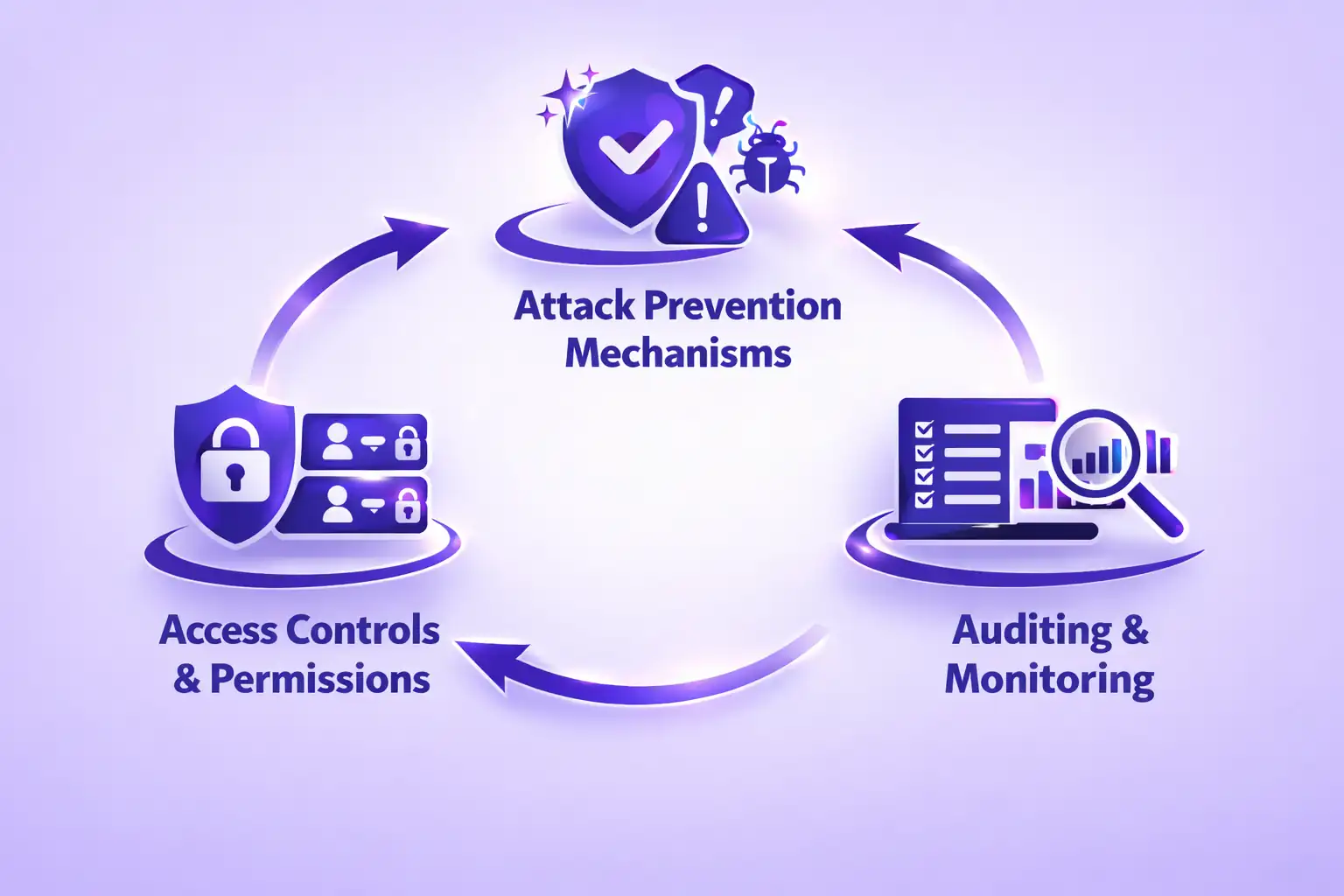
Critical Security Measures for DAO Smart Contracts
Access Controls and Permissions
- Role-based permissions for contract functions
- Multi-signature requirements for critical operations
- Guardian mechanisms for emergency pauses
- Upgrade authorization through governance only
Attack Prevention Mechanisms
- Flash loan protection via snapshot voting
- Timelock delays on approved proposals
- Reentrancy guards on state-changing functions
- Rate limiting on proposal submissions
Auditing and Monitoring
- Professional security audits before deployment
- Formal verification of critical logic paths
- Real-time monitoring of voting patterns
- Bug bounty programs for vulnerability discovery
Smart Contract Automation in Governance Decisions
Automation represents the defining characteristic that distinguishes DAO governance from traditional organizational structures, with smart contracts executing approved decisions without requiring intermediary action or trust in any centralized party. Once proposals pass voting thresholds and survive timelock periods, execution contracts automatically implement changes through direct blockchain state modifications. This automation extends beyond simple parameter updates to complex operations including treasury fund transfers, integration with external protocols, token minting or burning, and even upgrades to the governance system itself through proxy contract mechanisms.[1]
The technical implementation of governance automation relies on carefully designed execution frameworks that validate proposal actions before deployment, ensure atomic transaction execution to prevent partial failures, and emit comprehensive event logs for community monitoring. Smart contracts batch multiple governance actions into single atomic transactions, guaranteeing that complex proposals either execute completely or fail entirely without leaving the system in inconsistent states. Advanced implementations incorporate conditional execution logic, enabling proposals that trigger different actions based on on-chain conditions at execution time.
Challenges in DAO Governance and Voting Systems
Voter apathy represents one of the most critical challenges facing DAO governance, with typical participation rates falling below 10% of total token holders in many organizations. This low engagement creates legitimacy concerns and enables minority control through coordinated voting by small groups of active participants. The principal-agent problem persists even in decentralized systems when most token holders remain passive while delegates or whale voters make critical decisions affecting the entire community.
Plutocratic governance concentration emerges naturally in token-weighted voting systems where wealthy holders dominate decision-making processes. Early investors, team members, and venture capital firms often control sufficient voting power to unilaterally approve proposals, potentially harming broader community interests while enriching concentrated stakeholders. This wealth-based power distribution contradicts the democratic ideals that motivate many DAO participants and can lead to governance capture by special interests.
Challenges in DAO Governance and Voting Systems
Participation and Engagement Issues
- Voter apathy with participation rates below 10% in most DAOs
- Lack of incentives for small token holders to vote
- Complex proposals requiring technical expertise to evaluate
- Governance fatigue from excessive voting requirements
Power Concentration and Fairness
- Plutocratic control by wealthy token holders and whales
- Early investor and team dominance in decision-making
- Vote buying and bribery through off-chain coordination
- Delegation creating centralized influence through representatives
Technical and Usability Barriers
- Complexity of blockchain wallets and transaction signing
- Poor user interfaces for proposal evaluation and voting
- High cognitive load understanding governance mechanisms
- Language barriers excluding non-English speaking communities
Future of DAO Governance and On-Chain Voting Systems
The future trajectory of DAO governance points toward sophisticated systems addressing current limitations while expanding decentralized coordination beyond cryptocurrency protocols. Cross-chain governance frameworks will enable DAOs to coordinate decisions across multiple blockchain networks, aggregating voting power from fragmented token distributions and executing proposals spanning different protocol ecosystems. This interoperability becomes critical as blockchain infrastructure fragments across specialized networks.
Frequently Asked Questions
A DAO (Decentralized Autonomous Organization) in smart contracts is a blockchain-based governance system where rules, voting mechanisms, and decision-making processes are encoded directly into self-executing code. Unlike traditional organizations with centralized leadership, DAOs enable token holders to propose changes, vote on governance decisions, and automatically execute approved actions through transparent on-chain processes. Smart contracts eliminate intermediaries and ensure that organizational rules are enforced programmatically without human intervention or manipulation.
Smart contracts enable DAO governance by automating proposal creation, voting processes, and decision execution without requiring trusted intermediaries. These contracts define voting thresholds, quorum requirements, and execution logic that automatically triggers when conditions are met. Token holders interact with governance smart contracts to submit proposals, cast votes weighted by their token holdings, and trigger automatic implementation of approved decisions. This creates transparent, tamper-proof governance where all actions are recorded on-chain and executable code replaces human administrators.
DAO smart contracts primarily use token-weighted voting, quadratic voting, and conviction voting mechanisms. Token-weighted voting allocates voting power proportional to token holdings, making it simple but potentially plutocratic. Quadratic voting costs increase exponentially with votes cast, reducing whale dominance. Conviction voting allows members to stake tokens over time to demonstrate commitment to proposals. Each mechanism is encoded in smart contract logic with different trade-offs between simplicity, fairness, and resistance to vote manipulation or whale control.
On-chain DAO voting systems provide transparency and immutability but face security challenges including smart contract vulnerabilities, governance attacks, and flash loan exploits. Well-audited contracts with timelock mechanisms, multi-signature requirements, and proper access controls significantly enhance security. The public nature of blockchain ensures all votes are verifiable and tamper-proof, but poorly designed voting mechanisms can enable vote buying, whale manipulation, or 51% attacks. Professional security audits and battle-tested governance frameworks are essential for maintaining DAO integrity.
On-chain DAO voting incurs gas fees for every transaction, including proposal submission, vote casting, and execution, which can become prohibitively expensive on networks like Ethereum during congestion. Large DAOs with thousands of participants face scalability challenges as each vote requires blockchain computation. Solutions include Layer 2 scaling solutions, snapshot voting with on-chain execution, vote delegation to reduce transaction volume, and choosing lower-cost blockchains. Organizations must balance decentralization ideals with practical cost considerations when designing governance systems.
Major real-world DAO applications include DeFi protocols like MakerDAO governing multi-billion dollar stablecoin systems, Uniswap managing decentralized exchange parameters, investment DAOs pooling capital for venture investments, and protocol DAOs managing blockchain network upgrades. Industries in the USA, UK, UAE, and Canada increasingly adopt DAO structures for managing community treasuries, distributing grants, coordinating open-source development, and making collective investment decisions. These applications demonstrate how smart contract governance can coordinate thousands of stakeholders without traditional corporate hierarchies.
Reviewed & Edited By

Aman Vaths
Founder of Nadcab Labs
Aman Vaths is the Founder & CTO of Nadcab Labs, a global digital engineering company delivering enterprise-grade solutions across AI, Web3, Blockchain, Big Data, Cloud, Cybersecurity, and Modern Application Development. With deep technical leadership and product innovation experience, Aman has positioned Nadcab Labs as one of the most advanced engineering companies driving the next era of intelligent, secure, and scalable software systems. Under his leadership, Nadcab Labs has built 2,000+ global projects across sectors including fintech, banking, healthcare, real estate, logistics, gaming, manufacturing, and next-generation DePIN networks. Aman’s strength lies in architecting high-performance systems, end-to-end platform engineering, and designing enterprise solutions that operate at global scale.



